Journey to Colorado, Part III
Day forty-four:
After leaving my campsite, I dropped down to Echo Lake where
I dried my tent, cooked another big meal, and fooled around until noon
time. Then, I crossed Squaw Pass and rode down to Denver once again,
stopped to eat in Bergan along the way.
This time, I stopped
by to stay with Earl, the 75 year-old biker I had met in Illinois.
Earl immediately wanted to go for a bike ride, but I pointed out that it
was late in the afternoon and I was tired from traveling. Earl showed
me a series of underground rooms that he had constructed underneath his
house. No mention was made of dinner, but Earl thought it was important
to show me anti-smoking movies until I was nodding. He told me that
I would need to sleep in the basement, which I did not object to, but then
he locked me in!
Echo Lake - Lakewood,
41 miles, 15.2 mph, July 10.
Rest (?) day:
The next day, there seemed to be no interest in breakfast, but Earl was
impatient to begin riding. We began a long ride on bike trails and
sidewalks heading down towards Denver proper. When we passed a supermarket,
I asked to stop, and I went in and bought some rolls for breakfast.
When I came out, Earl was hungry too, so he helped me eat.
While eating,
we met a 67 year-old Harry, cycling from Minnesota, who stopped for groceries.
Earl agreed to show him the bike trail south, so we cycled a good distance
south with him. Then Earl led me north across Denver on the South Platte
bike trail, along the exact route I had followed earlier. He insisted
on eating in McDonald's downtown, where all I could get was a poor and
expensive (for me) fish sandwich.
As we traveled
northwards, it was obvious that a major storm was brewing behind us.
I had kept telling Earl that I wanted to call my cousin to see when I could
visit with him and his parents (who were both ill), and Earl had been asking
me to wait until later. But, with the rain threatening, Earl now
began urging me to call him at every opportunity and to ask him to pick
us up. Finally, after we left the bikeway, the rain began.
Earl found shelter, and he sent me through the pouring rain to find a telephone.
Of course, my cousin could not pick us up, but we agreed for me to visit
his folks the next day. When I got back to where Earl had been, he
was gone. Someone told me that he had accepted a ride almost immediately.
Actually, the rain
was already ending. We had escaped the worse of it. As I re-crossed
Denver, I saw a swollen stream, piles of hail stones looking like snow
on the ground, smashed windows, dented car tops, and torn down tree limbs.
My cousin later told me that hailstones the size of softballs had torn
up the golf course. I was smart enough to get something to eat on
the way back because Earl never mentioned food after I returned.
Lakewood - Lakewood,
67 miles, 10.4 mph, July 11.
Rest day:
In the morning, I needed to eat again, so we made a trip to a supermarket,
where Earl once again demonstrated that he was hungry too.
I then left for the day to visit my aunt, uncle, and cousin (a different
aunt and uncle from the ones I had visited earlier). On the way to
their home in Arvada, I tried to follow the bike trails, using a map.
It was a very slow and difficult trip because cycling on the trails was
slow and because the trails were hard to find.
We had a longer
visit than intended because my cousin was delayed with an investigation
he was completing. However, he brought a Chinese take-home meal with
him, and we had fun eating and talking. Then I started back, later
than I had intended. When I got back to Earl's, he had gone to bed
early and locked up my gear, so I had to sleep under old carpets that I
found. I say "had to" because temperatures get very low at night
in Denver.
Lakewood - Lakewood,
22 miles, 11.7 mph, July 12.
Day forty-five:
This morning, I was treated a little differently, and even offered some
cereal and fruit for breakfast. No mention was made of my sleeping
under the carpets. It was implied that the whole problem had
been my wanting to see my cousin and that I would now receive better treatment.
However, I had
a different view of things, and I politely and briefly made it clear that
I was ready to depart. Even though I did not have enough sleep the
previous night, I had a tremendous desire to leave Denver far behind me.
I crossed Denver and Aurora, using roads when possible and bike paths otherwise.
On a street in
Aurora, an old van with two men in it passed me and then pulled over to
the curb. Just as I was passing, the driver flung the door open,
but I had kept my distance, and so I was not hit. However, I glanced
back to see that the men were upset that they had not hit me.
The bike trails
were poor for traveling; my speed on them was low, they wound around terribly,
and I had to stop and walk across at intersections frequently. I
was very glad when the last of them was behind me. I probably should
have taken the South Platte route again. From Aurora, I took a road
north that took me to the interstate. Then I followed the service
road alongside the interstate. At one point, I saw a grove of trees
between the road and the railroad, just big enough to get out of sight,
so I camped there.
Lakewood - Roggen,
88 miles, 11.2 mph, July 13.
Day forty-six:
Today, I was wanting to go as far and as fast as possible, and a had a
bit of a tail wind, not enough to give me a high average speed, but enough
to take the pain out of the ride. Also, a major help was encountering
another cyclist, who rode with me for many miles.
I made good time
in the morning partially because there was nothing to look at. Also,
I had been told that two Maryland cyclists were on the road just ahead
of me, and I hoped to catch up. My speed was above 15 mph during
the early part of the day, but gradually declined, although I struggled
to keep it high. I stopped in Merino, where the road crosses the
South Platte River, for a two-hour break after traveling 68 miles with
just short stops. When I started again, I saw no immediate improvement
in my speed, but after Sterling, I started traveling faster, a clear indication
that I was getting help from a breeze.
I will always remember
Crook because the people were so friendly there when I checked about camping
in their town park.
Roggen - Crook,
110 miles, 14.2 mph, July 14.
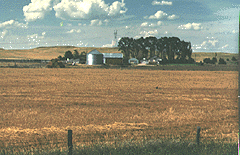 Day
forty-seven: I had a pleasant night's sleep but slept
in late. I seemed to be fighting headwinds, but I couldn't detect
them after I stopped to rest at Sedgwick. Day
forty-seven: I had a pleasant night's sleep but slept
in late. I seemed to be fighting headwinds, but I couldn't detect
them after I stopped to rest at Sedgwick.
At Big Springs
not far beyond the Nebraska line, I joined the old stage coach/pony express
route reported on by Mark Twain. This route was also part of the
Oregon and Mormon Trails. Big Springs is also the location of a great
train robbery in 1887. Sam Bass and his gang got $60,000 in gold,
but Sam was killed a year later on his 27th birthday. The town park
included two chainsaw carvings made from a tree in the park; the tall stump
had been shaped into the robber, and part of the remaining trunk had a
carving of the train.
That evening, I
spent the night in Ogallala City Park, where the sprinklers came on late
at night, surprising me and raining on the tent.
Crook - Ogallala,
Nebraska, 66 miles, 11.4 mph, July 15.
Day forty-eight:
This was an uneventful day, as were most of my days crossing Nebraska on
this trip. I had no noteworthy difficulties, my conversations with
people were casual and short, and the terrain was very much the same, day
after day. Since I was riding in the Platte River Valley, I didn't
have much of a view either. Each night, I checked about camping in
the town park, which was always agreeable.
About the only
difference was the wind, while shows up in my average speed for the day.
I had been expected good speed on the return trip, but the winds were not
helpful. On this day the wind was at first unfavorable in the morning,
became favorable, and then got gradually worse towards evening. For
the best 12 miles of the day, my average speed was 15.3 and for the worst
14 miles, it was 10.6 mph.
I crossed the North
Platte River (at North Platte, of course), and it was full of water there.
When I crossed the combined North and South Platte Rivers just 150 miles
downstream, very little water was left, due to irrigation.
Maxwell was the
one town where I did not ask permission to camp; the town was very small,
and there was no one in sight. It was a pleasant little park to camp
in.
Ogallala - Maxwell,
69 miles, 12.6 mph, July 16.
Day forty-nine:
I started at 7:20 and stopped to eat my breakfast of donuts at Brady, nine
miles farther on. Before reaching Gothenburg, I ran into construction
on the road.
The railroad along
this route must be one of the busiest in the US. There was constant
train traffic in both directions, and the railway was double tracked as
a result.
That night, I camped
at Elm Creek, a larger park, the events of the day and the scenery unremarkable.
Maxwell - Elm Creek,
71 miles, 10.4 mph, July 17.
Day fifty:
I met an extremely interesting cyclist today. Probably in his
60's and dressed in blue jeans, polyester shirt, and golf cap, he was traveling
westward, and he told me that when he reached the West Coast, he would
turn around and cross the US again. His bike was an old single speed
child's bike from the 50's, stripped of the fake gas tank. He had
built his carriers of lawn furniture tubing. On them, he had an assortment
of cardboard boxes and plastic bags plus an old styrofoam chest.
He told me that
he had been married and working in a factory, freezing in the winter and
sweating through the summer, and getting no pleasure out of life.
Then he discovered that his wife was unfaithful to him, and that she and
the kids were laughing at him, so he just walked out and never went back.
He had been living since on the road, just picking up enough money to live
on and never trying to own anything. He had traveled most of the
US (and had passed through my area of Alabama).
If he needed a
place to sleep, he just looked for a bridge to sleep under; he was not
about to sleep in a park, where the police might harass him. He paid
no attention to "no trespassing" signs. He cared nothing about possessions.
If a bike was stolen or damaged, he just got another one out of a trash
dump. On one occasion, he had been hit by a car and taken to a hospital.
As soon as he awoke, he snuck out of the hospital, leaving everything behind.
Henry Thoreau, who said, "a man is rich in proportion to the number of
things he can afford to leave alone" would have loved to have talked with
him.
When I reached
Kerney, I met another cyclist, this one 75 years old and riding an Easy
Rider recumbent, completely faired with cloth. He told me that his
doctor had warned him about his heart, and he was now averaging over 250
miles a week.
In the afternoon,
I crossed the Platte River, now pretty dry, which I had first met in the
Rockies, and left the Platte River Valley. The first cyclist had
told me that he camped near the river here, but I found that there were
"no trespassing signs" and no trees, so I went on.
In Aurora, I visited
with Jeff, a young cyclist who was interested in bicycle camping trips,
before traveling to the town park well after dark.
Elm Creek - Aurora,
80 miles, 11.1 mph, July 18.
Day fifty-one:
The next morning, the rain began to fall before I entered the supermarket
for my breakfast. I left in front of a storm, hoping to outrun it,
but this time there was a crosswind instead of a tailwind, so the storm
caught me.
I ended up riding
in rain all day long, seven inches worth in a state that averages ten inches
a year. When I reached York, thoroughly drenched, I headed to the
library and spend the worst part of the day hiding there.
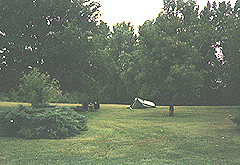 While
in the library, I met a man who told me that he resented having to be careful
with cyclists on the road. After I left, three different motorists
honked loudly at me, even though I was on the shoulder, six feet from the
road. Back on the highway, the wind blew my hat off (it had been
damaged from exposure to the sun, and the elastic was getting weak).
I turned around and rode back to get it, but before I got there, a truck
swerved part way into the other lane and hit it square, evidently a deliberate
act. This behavior today, the reckless passing below Berthoud Pass,
and being yelled at a few times were the only problems that I had with
motorists on this trip. While
in the library, I met a man who told me that he resented having to be careful
with cyclists on the road. After I left, three different motorists
honked loudly at me, even though I was on the shoulder, six feet from the
road. Back on the highway, the wind blew my hat off (it had been
damaged from exposure to the sun, and the elastic was getting weak).
I turned around and rode back to get it, but before I got there, a truck
swerved part way into the other lane and hit it square, evidently a deliberate
act. This behavior today, the reckless passing below Berthoud Pass,
and being yelled at a few times were the only problems that I had with
motorists on this trip.
The park that night
in Seward was flooded, but I camped on the highest knoll and was OK.
Aurora - Seward, 57 miles, 11.7 mph, July 19.
Day fifty-two:
Hills were more frequent and steeper today but never steep enough to require
the use of my smallest chainring. I started a little late in
the morning and passed one store, hoping for a better one. As a result,
I ended up riding all the way to Lincoln with only one carrot to eat.
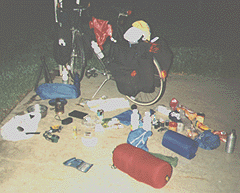 In
Lincoln, I visited the Bike Peddlers, where I received a friendly greeting
and a bike map of Lincoln. I followed another bike trail through
town as a result. In
Lincoln, I visited the Bike Peddlers, where I received a friendly greeting
and a bike map of Lincoln. I followed another bike trail through
town as a result.
That evening, as
I cycled past Unadilla, I noticed that there was a roof over some picnic
tables in park near the highway, so I decided to pitch my tent underneath,
a wise decision considering the weather (it rained during the night).
Seward - Unadilla,
58 miles, 11.8 mph, July 20.
Day fifty-three:
I left my campsite at 8:20 but then spent over an hour talking to some
folks at a gas station. It started raining before I reached Nebraska
City, pedaling over some small hills. I stopped in a Schwinn bike
shop to get directions to the library, where I once again hid from rain
until four, but the rain never amounted to much.
When I crossed
into Iowa, I found some marijuana growing by the side of the road.
My first impulse was to carry a few leaves with me, but before I did any
such fool thing, I realized that I could go to jail for doing so.
So, I took a picture instead. Could they put me in jail for a picture?
After I reached
Iowa, I traveled on some very back roads for a ways before joining up with
highway 2. There was a rest stop marked on the road map, but I discovered
that it had been turned into a county RV park, completely unsuitable for
cyclists.
I traveled on to
Clarinda, a little large for camping, as it had a population of over 5,000.
Before I was allowed to camp in the park, the police had to ID me, the
only time this had happened.
Unadilla - Clarinda,
Iowa, 78 miles, 10.8 mph, July 21.
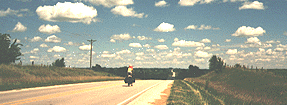 Day
fifty-four: Before leaving town in the morning,
I nearly lost all my traveler's checks. I went into a small store
and bought fruit, fried potatoes, and donuts (I ate anything that was cheap).
I set my traveler's checks on the counter while receiving my change, and
I forgot to pick them up when leaving. Immediately after leaving,
I turned back knowing that I didn't have them, but the shift had changed,
and no one knew anything about traveler's checks. Finally, the young
woman who had helped me was summoned, and she reported that she had "put
them in the manager's office." So, she went into the office and returned
with them. I can't help thinking that she had tried to steal them,
as she had not said a word to me after I had left the counter and while
I was lingering outside, nor had she spoken to any of the other employees.
I recovered the checks only because I clearly remembered where I had left
them and because I was stubborn enough to insist that I had left them there
until someone fetched her. What if I had left cash? However,
this behavior was exceptional; I have been overcharged at times, but no
one else has ever tried to steal from me. Of course, it is possible
that she was just being thoughtless rather than being a thief. In
any event, she could not have cashed the checks, and I could have gotten
replacements. Day
fifty-four: Before leaving town in the morning,
I nearly lost all my traveler's checks. I went into a small store
and bought fruit, fried potatoes, and donuts (I ate anything that was cheap).
I set my traveler's checks on the counter while receiving my change, and
I forgot to pick them up when leaving. Immediately after leaving,
I turned back knowing that I didn't have them, but the shift had changed,
and no one knew anything about traveler's checks. Finally, the young
woman who had helped me was summoned, and she reported that she had "put
them in the manager's office." So, she went into the office and returned
with them. I can't help thinking that she had tried to steal them,
as she had not said a word to me after I had left the counter and while
I was lingering outside, nor had she spoken to any of the other employees.
I recovered the checks only because I clearly remembered where I had left
them and because I was stubborn enough to insist that I had left them there
until someone fetched her. What if I had left cash? However,
this behavior was exceptional; I have been overcharged at times, but no
one else has ever tried to steal from me. Of course, it is possible
that she was just being thoughtless rather than being a thief. In
any event, she could not have cashed the checks, and I could have gotten
replacements.
On down the highway,
some truckers began playing games with me. While I stay on the road
when cars come up from the rear, I move off of the road if a truck may
have trouble passing. The truckers noticed this, and they began to
take advantage of me. When a vehicle was coming towards us, they
would speed up or slow down to make sure they would pass me just at the
same time as the other vehicle, forcing me off the road. To make
the situation more dangerous, some of the on-coming vehicles were Amish
buggies. After I got wise to what they were doing, I stayed on the
road when one truck did this, ignoring the blasting air horn, the black
smoke, the squealing brakes, and all. It never happened again.
I'm sure the driver got on his CB and told the others to back off.
I stopped to rest
at the pool at Mount Ayr and used the opportunity to eat, dry some road
maps which were still wet, and to plan the rest of my trip.
After many more
rolling hills, I reached Leon. While in town, two girls were cycling
by, and in watching me, the one fell down. She was not seriously
injured, but she was seriously embarrassed. I stopped at a store,
and the owner called the police for me. They informed him that I
couldn't camp in town due to an ordinance, but I must ride to a lake three
miles north where I would pay to camp. But, having seen one unsuitable
county park, I did not feel like adding six miles to my trip to camp in
another. The people in the store had some suggestions: one suggested
I go out to the fairgrounds and another that I camp under a bridge, and
all advised me not to go on. Nonetheless, I decided to go on anyway.
Less than two miles out of town, I found a nice hill out of sight on the
state right of way where the road was going to be widened. I was
over half a mile from any house and had a tremendous view. During
the night, I heard coyotes howling.
Clarinda - Leon,
80 miles, 12.2 mph, July 22.
Day fifty-five:
In the morning, I got going at 7:25. My tent, sleeping bag, and everything
were wet due to a mild rain and a heavy condensation (the second being
a sign that I was finally back East). After riding 20 miles to Corydon,
I bought some food, and stopped in the town park to dry my sleeping bag
and tent and to cook a good meal. While there, an attractive married
woman with three kids came by and talked to me. She wanted me to
go to her house for a shower, but I really didn't need the shower, and
I was unsure of her motive.
I discovered that
day, purely by accident, that I had not been receiving my 5¢ deposit
back on my soft drink cans all the way across Iowa (I had thought it was
a sales tax). The discovery made me think of the song about Iowa
people in the Music Man. One line goes, "Oh, there's nothing
half-way about the Iowa way to treat you, if we greet you, which we may
not do at all."
During the day,
I had a breeze behind me and lower hills, so my average speed was higher.
I knew better than to ask to camp at a town park, so I camped for the night
under a bridge. It was by no means a poor spot.
Leon - Fox River,
93 miles, 14.7 mph, July 23.
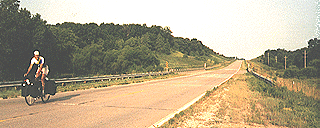 Day
fifty-six: I stopped to take a picture of my crossing
the bridge at Fox River, and then stopped in Farmington, where I talked
to an Iowa conservation man and the store owner about my route. I
stopped at a rest stop just before I reached Keokuk, probably where I had
also stopped to rest in 1966. I crossed over the Mississippi at Keokuk,
but I couldn't get a picture of the bridge, so I took a picture of the
dam just about the bridge instead. Day
fifty-six: I stopped to take a picture of my crossing
the bridge at Fox River, and then stopped in Farmington, where I talked
to an Iowa conservation man and the store owner about my route. I
stopped at a rest stop just before I reached Keokuk, probably where I had
also stopped to rest in 1966. I crossed over the Mississippi at Keokuk,
but I couldn't get a picture of the bridge, so I took a picture of the
dam just about the bridge instead.
In Hamilton, Illinois,
I stopped at Dadant, Inc., to talk to a grandson about the Dadant's and
the bee industry for a few minutes, and then I rode by the old Dadant home.
From there, I traveled
down a narrow and dangerous road to Lima, where I received permission from
the major to camp in the town park. Many kids were in the park for
Bible school, but the people conducting the school treated me as a welcomed
guest and offered me cookies after my spaghetti dinner ruined. This was
a very pleasant change from Iowa.
Fox River - Lima,
Illinois, 77 miles, 12.7 mph, July 24.
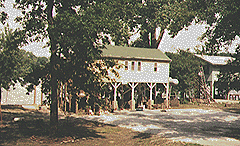 Day
fifty-seven: In the morning, one of the men from the Bible
school came by to say good-bye. He suggested a route along
a road closer to the river that avoided highway 96 for a ways. Traveling
through Quincy, I saw houses on stilts along the Mississippi. This
area with its pleasant people must have been later devastated by the floods
along the river. Day
fifty-seven: In the morning, one of the men from the Bible
school came by to say good-bye. He suggested a route along
a road closer to the river that avoided highway 96 for a ways. Traveling
through Quincy, I saw houses on stilts along the Mississippi. This
area with its pleasant people must have been later devastated by the floods
along the river.
I had a pleasant
day's ride, although the greatest excitement seems to have been watching
a street being repaved while resting and eating in a gazebo at Payson.
At Pleasant Hill,
I stopped at a store to see about camping, and the woman called the police
station for me. The police suggested that I stay at River Road Campground.
However, a policeman walked in, and he suggested that I stay at the town
park, up on top of the hill, which was much more suitable for me.
I thought the name for this town perfectly matched my experience there.
Lima - Pleasant
Hill, 72 miles, 11.1 mph, July 25.
Day fifty-eight:
Before starting out, I changed a tire and washed up. After traveling
a dozen miles farther south, I turned eastward, crossing the Illinois on
a ferry at Kampsville. My son's girlfriend (now his wife) was working
in the same town, although I didn't know it at the time. Before crossing,
I stopped at a store for food and also received some good information from
the women there about my projected route around East St. Louis.
Following their
advice, I headed east to Carlinville, where I intended to camp in the town
park. However, when I arrived in town in the early dusk, I saw immediately
that I had a problem: it was a larger town than I thought, and it was a
college town, with students on the streets everywhere. I said to
myself, "They aren't going to let you sleep in this town."
Nonetheless, I went by the police station, not knowing what else to do.
There I was asked to wait to see the police chief while the sky turned
black outside. When I was led to see the chief, I had to wait another
long period while he finished some important work. Then, when he
finally looked up at me, his first words to me were, "You know, I can't
let you camp in town." I sat breathlessly (feeling like cussing a
blue streak) until he went on, "But we have a good camp outside of town,
if you can ride three miles farther."
So, following his
directions, I pedaled out of town on a night as black as ink. Soon,
I was traveling rolling hills that had recently been re-graveled.
I passed suitable places for camping (I thought), but the chief had said
he would come along to check on me, and I felt I would be in trouble with
him if I did so. Finally, I reached the indicated site to find a
long row of RV's. I pulled into the camp, feeling disgusted.
I felt trapped into camping here, and I fully expected to pay $15 for a
nasty site, I supposed. The manager came up to me fussing a
little bit, "Why didn't you let me know you were here? How can I
be expected to hear a bicycle pull up?" And he proceeded to tell
me that normally he charged a good fee and made people camp crowded close
together. But then he added, "But we always let those who pedal here
camp for free down next to the lake."
Pleasant Hill -
Carlinville, 68 miles, 11.2 mph, July 26.
Day fifty-nine:
Before leaving the campground, I pushed my bike up to the bathroom, and
got ready to got take a shower. A car pulled up, and the driver,
seeing that I was about to go in, jumped out of the car and dashed in ahead
of me. It's bad enough having them act that way on the highway.
I stayed on highway
4 today, skirting East St. Louis. All day long, I found myself being
endangered by reckless and impatient drivers who did not want to loose
a few seconds. The worst part was between the interstates 70 and
64, where people were taking a short-cut without wanting to reduce their
speed. I stopped twice to read in libraries, once in Stauton and
once in Lebanon.
When I reached
Fayetteville, I checked to see if I could camp in the town park.
Everyone in the park was very friendly; the only problem was that they
had some kind of event staged in the park for the evening, and they were
afraid I wouldn't be able to sleep. The town councilman thought
of a solution, if it was OK with me, I could pitch my tent in his back
yard across the street. Before I did so, he invited me inside where
he and his wife feed me a meal and asked me questions about my trip.
Carlinville - Fayetteville,
66 miles, 11.5 mph, July 27.
Day sixty:
In the morning, we had another visit, and a contractor who stopped by suggested
my route for the day. I traveled west for five miles, and then I
turned south for three, and then I had a long ride eastward on a well paved,
lightly traveled, county road that ran from Darmstadt through Lively Grove
to Waltonville.
Along the way,
I found a place to dry my tent and sleeping bag in Dubois (a single-wall
tent collects a lot of condensation in the East when it is pitched out
in the open), and I also used the opportunity to catch a nap. At
Waltonville, I stopped to talk to two old men, one of them telling me about
his experiences during W.W.II as if they happened yesterday. I enjoyed
hearing his eye-witness accounts, and I remembered my talking about 1965
as if it was yesterday.
I turned south
at Waltonville down to 154 and then turned east to cross Rend Lake.
When I reached the lake, I noticed how the steel guardrails seemed to deny
most people the use of a section of the lakeside, so I lifted my bike over
the rails and had a nice section of lake shore all to myself. Then
I had a good bath. It seemed like a great place to camp for the night,
so I went no farther, even though it was still a little early.
Fayetteville -
Rend Lake, 62 miles, 11.5 mph, July 28.
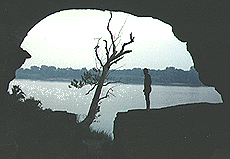 Day
sixty-one: Today, I traveled south to Benton and southwest
to Harrisburg, then over the hills to Elizabethtown and Cave in the Rock.
The day became very hot, and I drank six soft drinks and ate ten pieces
of fruit during the day, plus some yogurt. In Benton, I stopped and
talked to motorcyclists who were traveling to a get-together. I discovered
that they did not mind at all that Westerners were calling us cyclists
"bikers," and I also learned that they had a high opinion of my form of
two-wheel travel. Day
sixty-one: Today, I traveled south to Benton and southwest
to Harrisburg, then over the hills to Elizabethtown and Cave in the Rock.
The day became very hot, and I drank six soft drinks and ate ten pieces
of fruit during the day, plus some yogurt. In Benton, I stopped and
talked to motorcyclists who were traveling to a get-together. I discovered
that they did not mind at all that Westerners were calling us cyclists
"bikers," and I also learned that they had a high opinion of my form of
two-wheel travel.
I saw some good
camping areas as I traveled through the national forest on highway 34,
but I felt I should have traveled over to El Dorado and down highway 1
instead, as I encountered heavy traffic on this route.
I was pleased to
visit Cave in the Rock. This cave was used by outlaws in the days
of Davy Crockett to rob boats traveling along the Ohio River. On
the inside, the cave is less than impressive, but it served the purposes
of the gangs that used it. Above the cave, along the bluff, were
the camping sites for the RV people. These spots had formerly been
used by tent campers. Now the tent campers had been stuck with muddy
sites back in the woods on steep hillsides.
Feeling pretty
insulted by the despicable sites offer by the state park, I decided to
take my chances elsewhere. But I had no sooner pedaled down to the
boat landing than the rain began to fall. David, Debbie, Bruce and
some others happened to be there, and they offered to let me camp on their
place, so I followed their vehicles out a small trailer and a roofed deck
on the edge of a high bluff over the river. The ride out there ended
up being a seven mile, hilly ride on dirt roads, with a very muddy climb
at the end. For the night, I slept out on the covered deck while
David and Debbie slept inside.
Rend Lake - Cave
in the Rock, 89 miles, 12.5 mph, July 29.
Day sixty-two:
In the morning, Debbie and I went for a walk along the river at the foot
of the bluff. Then David, Debbie, and I went back to Cave in the
Rock (my bike in their truck), where they took me to a breakfast of pancakes
and out on their boat on the river.
Then I crossed
the Ohio on the ferry and rode through the hilly, wooded country to Marion.
On the way, I started seeing indications that some of the people were Amish.
First, I saw boys out playing in black hats. Then I saw women in
long, black dresses. I was passed by a buggy driven by a teenage
girl wearing a long, light green dress. In Marion, I saw a woman
and a boy in the store who were doing their shopping by buggy.
I traveled south
from Marion and then west a little to the Land Between the Lakes again.
However, I arrived feeling quite sick and with the problem of diarrhea
(I felt fine the next day). I camped about two miles north of my
LBL #2 camp site. During the day I had seen three deer, one near
the ferry and two in the LBL.
Cave in the Rock
- LBL (#3), 54 miles, 11.8 mph, July 30.
Day sixty-three:
Today I bought a map of the LBL, ironic since I didn't know when I would
be back. It is definitely a place worth visiting and would be great
for a cycling-fishing trip. I stopped by the picnic spot and pond
near where I had camped on the way out, but it was crowded with people,
so I couldn't eat there. I tried to revisit my camp site, but I already
couldn't remember exactly where it was. Traveling farther, I came
to a 1850 farmhouse, but did not visit due to the $8.50 entry fee.
Stopping for lunch, I talked with two 1st grade teachers from Cleveland.
After leaving the
Trace, I turned left and rode through Dover. While in a store in
Dover, I once again forgot my traveler's checks, but this time the clerk
brought them out to me. I then traveled along Barclay Lake and up
some hills through the state forest. This was much better than the
route on the way up.
I noticed a road
going back into the forest, so I turned off. I found a hidden spot
and prepared my camp for the night. Two deer came by the tent.
One watched me for a couple of minutes and then walked past. The
second one spooked soon after she saw me, and then they both ran off into
the woods together, and I heard them snorting their warning sound for some
time.
LBL (#3) - Steward
Forest, 56 miles, 11.7 mph, July 31.
Day sixty-four:
The next morning, I entered Erin and got some groceries. Rather than
follow my route up, I pedaled south through the woods on highway 13.
This was an excellent route as it was wooded and scenic most of the distance
between Erin and Alabama, the traffic was light, and people were friendly.
It also makes a good connector between the LBL and the Natchez Trace.
Unfortunately,
when the time came to camp, I found myself near Linden, where there were
fewer opportunities. Just before I reached Linden, I saw a good spot
to camp on a rock bluff, but before I could stop, a man drove his pickup
in and parked. Just after leaving Linden, while it was rapidly growing
dark, I saw a patch of trees alongside the road. There was no room
to pitch a tent, but I decided to camp anyway, as there was no problem
from insects. However, I did get sprinkled with rain in the early
morning.
Steward Forest
- Linden, 71 miles, 12.4 mph, August 1.
Day sixty-five:
The next morning, I started extra early, as I always do when sleeping without
a tent. In Flatwoods, a rustic town, I stopped to talk with a man
for a little. In Waynesboro, a much bigger town, I stopped for a
much longer time and visited with an ex-hippie selling produce in the center
of town. He gave me a cantaloupe and a jug of cider to enjoy
on my trip.
Near Collinsworth,
I encountered the Natchez Trace, and I rode on it a short distance.
When I stopped in a grocery for some food, the woman insisted on giving
me some orange juice and wanted to know if I was writing a book about my
trip.
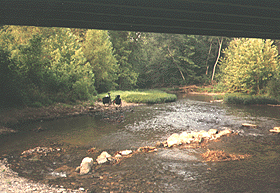 After
I reached Alabama, I started traveling eastward, using whatever roads I
could find. Finally, when near Lexington, I crossed over a high bridge
above the stream. I heard voices and pulled off to discover some
boys swinging into the river. After talking with them before
they left, I decided that it would be OK to camp there if I just got away
from the road. So I walked downstream below the bridge and camped
on the stony creek bed, close to the river. After
I reached Alabama, I started traveling eastward, using whatever roads I
could find. Finally, when near Lexington, I crossed over a high bridge
above the stream. I heard voices and pulled off to discover some
boys swinging into the river. After talking with them before
they left, I decided that it would be OK to camp there if I just got away
from the road. So I walked downstream below the bridge and camped
on the stony creek bed, close to the river.
Linden - Lexington,
77 miles, 11.5 mph, August 2.
Day sixty-six:
When I folded my tent in the morning, I was determined to get home in one
day, so I rode for 123 miles and nearly ten hours to my cabin. My
first stop was Lexington three miles up the road, then I turned south a
few miles later and zigzagged down to Anderson.
From there I followed
a hilly and winding road down to Athens. In Athens, I asked for directions
at the fire station for a road that would allow me to run parallel to the
highway. But the person I asked gave confusing directions, and I
lost my sense of direction and ended up on highway 72 anyway. Because
I was determined to ride the rest of the way to my cabin in one day, I
decided to stay on the main road, which I did all the way through Huntsville
and across the mountain.
Once I crossed
the mountain on Andrew Jackson, I turned onto the old highway, and up the
road I turned onto the Maysville road, thus taking a longer and more scenic
route to avoid the fast and sometimes hostile traffic for a few miles.
Then I had to rejoin
the main road until shortly before Woodville, where I turned onto the old
highway and then onto an even older highway. I traveled on into Scottsboro,
where I got something to eat, and then on up to the cabin well after dark.
Lexington - Scottsboro,
123 miles, 12.7 mph, August 3.
Rest day:
I spent a day at the cabin and also made another trip into town.
Cabin - cabin,
32 miles, August 4.
Day sixty-seven:
Finally, I returned to my starting point in Gadsden, taking the shortest
route. On the way, I was hit by one final thundershower, which forced
me to seek shelter at a church. It had been a wet trip, but I had
never had damp spirits.
Scottsboro - Gadsden,
69 miles, 12.2 mph, August 5.
At one
point on my trip, I tried to discuss Cheers and its characters:
Sam the lover who can't love; Norm, the faithful husband, who lives at
the bar and never sees his wife; Cliff, the expert on every subject, who
can't take care of himself; Diane, the scatterbrained intellectual, who
is more swayed by belief than reality; and Dr. Crane, the incompetent psychiatrist
with no understanding of human nature. They are all losers, yet few
people see their weaknesses because we have become a nation of losers.
We tend to identify with their meaningless existence and are willing to
accept posturing for reality. In fact, a good way to become unpopular
is to be frank or to do a task well.
I'm not saying
that we all must ride a bike to Colorado to prove that we are real, but
each person should live a life that doesn't depend on self-deceit.
Betsy was tickled by the people who drove to the top of passes and then
had their pictures taken to prove their accomplishments, while I saw cyclists
who had paid to be driven to the tops so they could coast down. I
also met bike riders crossing the US who accepted pickup rides whenever
possible. I don't think my riding the bike to Colorado was any harder
than my teaching or going back to school; these tasks all require faith,
commitment, hard work, and coping with stress. The challenge is always
to live an honest life with real results.
|